新概念英语第二册第27课-A wet night
- 格式:docx
- 大小:24.77 KB
- 文档页数:9
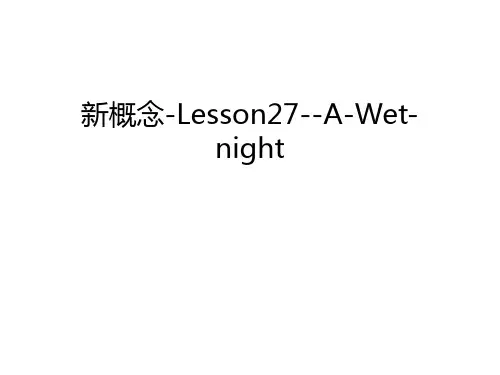
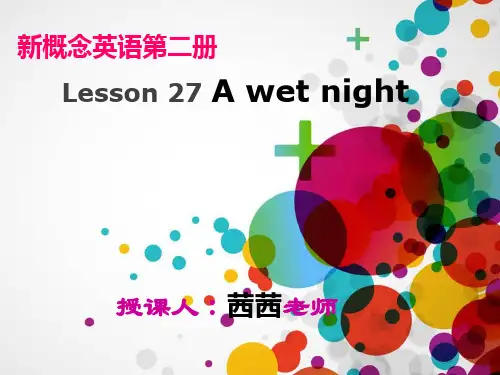
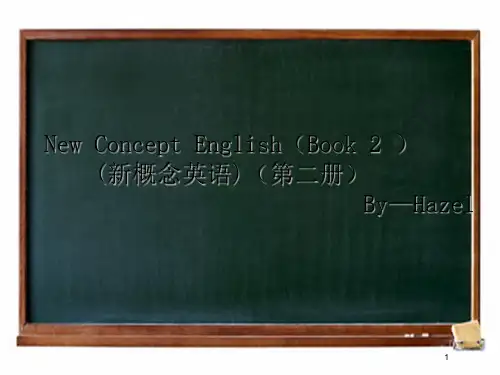
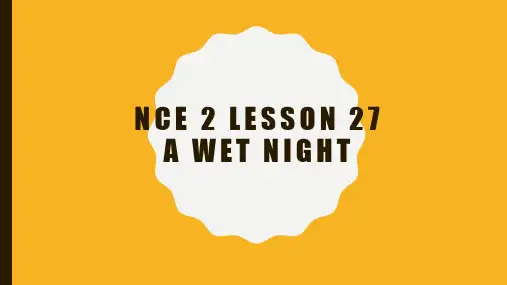
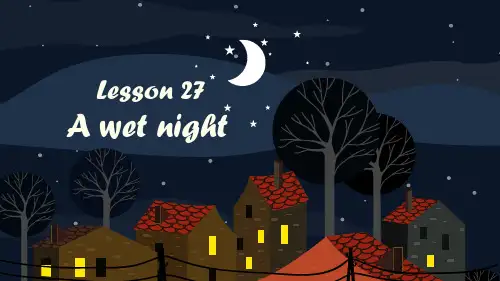
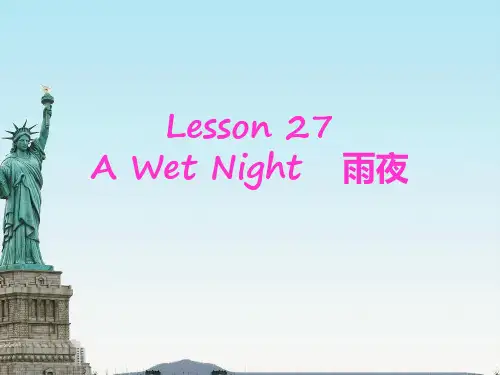

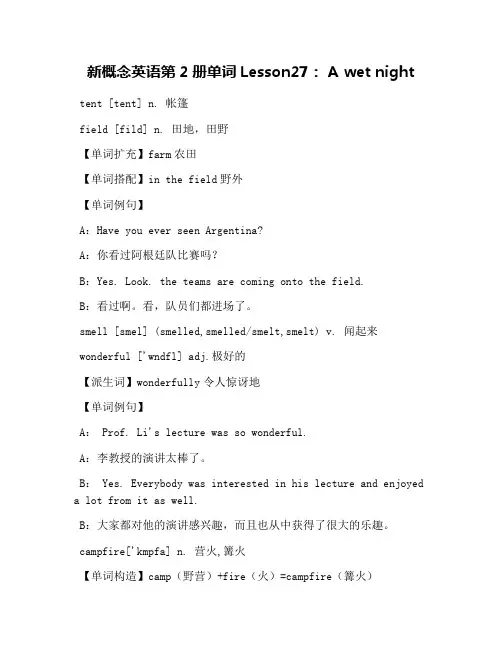
新概念英语第2册单词Lesson27: A wet night tent [tent] n. 帐篷field [fild] n. 田地,田野【单词扩充】farm农田【单词搭配】in the field野外【单词例句】A:Have you ever seen Argentina?A:你看过阿根廷队比赛吗?B:Yes. Look. the teams are coming onto the field.B:看过啊。
看,队员们都进场了。
smell [smel] (smelled,smelled/smelt,smelt) v. 闻起来wonderful ['wndfl] adj.极好的【派生词】wonderfully令人惊讶地【单词例句】A: Prof. Li's lecture was so wonderful.A:李教授的演讲太棒了。
B: Yes. Everybody was interested in his lecture and enjoyed a lot from it as well.B:大家都对他的演讲感兴趣,而且也从中获得了很大的乐趣。
campfire['kmpfa] n. 营火,篝火【单词构造】camp(野营)+fire(火)=campfire(篝火)【单词扩充】bonfire篝火【单词例句】A: Let's make the campfue burn up.A:让我们把篝火烧旺。
B: OK.1 will take some more wood here.B:好的,我再多拿点木头过来。
creep[krip] (crept[krept],crept)v. 爬行sleeping bag [slip-bg] 睡袋comfortable• ['kmftbl] adj.舒适的,安逸的【单词扩充】cozy舒适的【单词例句】A:Do you want to have a close shave now?A:您想现在修面吗?B:Yes, I'd feel very comfortable after having a close shave. B:对。
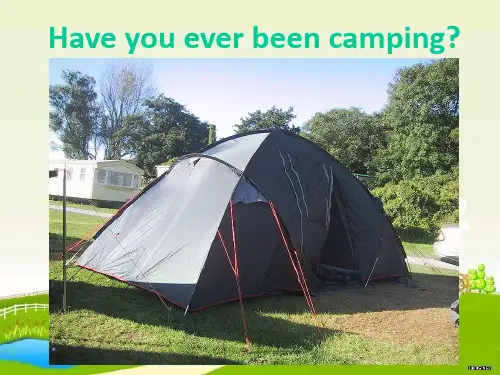
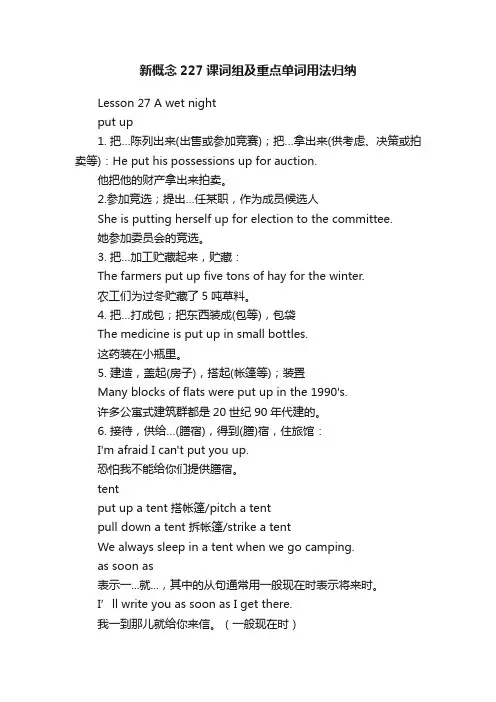
新概念227课词组及重点单词用法归纳Lesson 27 A wet nightput up1. 把…陈列出来(出售或参加竞赛);把…拿出来(供考虑、决策或拍卖等):He put his possessions up for auction.他把他的财产拿出来拍卖。
2.参加竞选;提出…任某职,作为成员候选人She is putting herself up for election to the committee.她参加委员会的竞选。
3. 把…加工贮藏起来,贮藏:The farmers put up five tons of hay for the winter.农工们为过冬贮藏了5吨草料。
4. 把…打成包;把东西装成(包等),包袋The medicine is put up in small bottles.这药装在小瓶里。
5. 建造,盖起(房子),搭起(帐篷等);装置Many blocks of flats were put up in the 1990's.许多公寓式建筑群都是20世纪90年代建的。
6. 接待,供给…(膳宿),得到(膳)宿,住旅馆:I'm afraid I can't put you up.恐怕我不能给你们提供膳宿。
tentput up a tent 搭帐篷/pitch a tentpull down a tent 拆帐篷/strike a tentWe always sleep in a tent when we go camping.as soon as表示一...就...,其中的从句通常用一般现在时表示将来时。
I’ll write you as soon as I get there.我一到那儿就给你来信。
(一般现在时)As soon as I went in, Jason cried out with pleasure.我一进门,Jason 就高兴的叫起来。
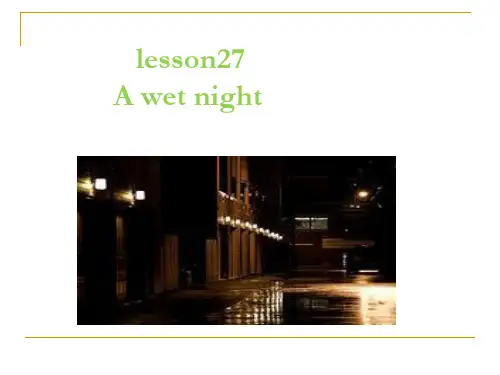
新概念英语第二册第27课:AwetnightLesson 27 A wet night雨夜First listen and then answer the question.听录音,然后回答以下问题。
What happened to the boys in the night?Late in the afternoon, the boys put up their tent in the middle of a field.傍晚时分,孩子们在田野中央搭起了帐篷As soon as this was done, they cooked a meal over an open fire.这件事刚刚做完,他们就在篝火上烧起了饭They were all hungry and the food smelled good.他们全都饿了,饭菜散发出阵阵香味After a wonderful meal, they told stories and sang songs by the campfire.他们美美地吃了一顿饭后,就围在营火旁讲起了故事,唱起了歌But some time later it began to rain. The boys felt tired so they put out the fire and crept into their tent.但过了一阵子。
天下起雨来,于是他们扑灭了篝火,钻进了帐篷Their sleeping bags were warm and comfortable, so they all slept soundly.睡袋既暖和又舒服,所以,他们都睡得很香In the middle of the night, two boys woke up and beganshouting. The tent was full of water!午夜前后,有两个孩子醒了,大声叫了起来。
新概念英语第二册第27课:A wet nightLesson 27 A wet night雨夜First listen and then answer the question.听录音,然后回答以下问题。
What happened to the boys in the night?Late in the afternoon, the boys put up their tent in the middle of a field.傍晚时分,孩子们在田野中央搭起了帐篷As soon as this was done, they cooked a meal over an open fire.这件事刚刚做完,他们就在篝火上烧起了饭They were all hungry and the food smelled good.他们全都饿了,饭菜散发出阵阵香味After a wonderful meal, they told stories and sang songs by the campfire.他们美美地吃了一顿饭后,就围在营火旁讲起了故事,唱起了歌But some time later it began to rain. The boys felt tired so they put out the fire and crept into their tent.但过了一阵子。
天下起雨来,于是他们扑灭了篝火,钻进了帐篷Their sleeping bags were warm and comfortable, so they all slept soundly.睡袋既暖和又舒服,所以,他们都睡得很香In the middle of the night, two boys woke up and began shouting. The tent was full of water!午夜前后,有两个孩子醒了,大声叫了起来。
原来帐篷里到处都是水!They all leapt out of their sleeping bags and hurried outside.他们全都跳出睡袋,跑到外面It was raining heavily and they found that a stream had formed in the field.雨下得很大,他们发现地上已经形成了一条小溪The stream wound its way across the field and then flowed right under their tent!那小溪弯弯曲曲穿过田野,然后正好从他们的帐篷底下流过去。
New words and Expressions生词和短语tentn. 帐篷fieldn. 田地,田野smellv. 闻起来wonderfuladj. 极好的campfiren. 营火,篝火creepv. 爬行sleeping bag睡袋comfortableadj. 舒适的,安逸的soundlyadv. 香甜地leapv. 跳跃,跳起heavilyadv. 大量地streamn. 小溪formv. 形成windv. 蜿蜒rightadv. 正好Notes on the text课文注释1 late in the afternoon,快到傍晚的时候。
2 put up(=set up ),搭起。
3 put out,熄灭(灯、火)。
4 wake up,醒来。
Lesson 27 自学导读First things first 课文详注 Further notes on the text1.…the boys put up their tent in the middle of a field.……孩子们在田野中央搭起了帐篷。
in the middle of表示“在……当中”、“在……中间”,既可以用于表示地理位置,又可以用于表示时间或在某个过程当中:He heard someone shouting in the middle of the night.午夜前后,他听到有人大声叫喊。
Mary was in the middle of reading when her aunt arrived.玛丽的姑妈到达时,玛丽正在读书。
in the centre of(在……中部/中央)则一般用于表示地理位置:Alice Spring is a small town in the centre of Australia.艾利斯斯普林斯是澳大利亚中部的一个小镇。
2.…they cooked a meal over an open fire.……他们就在篝火上烧起了饭。
open fire指无遮盖的、没有围起来的火,如篝火、盆火等。
3.…they told stories and sang songs by the campfire.……(他们)就围在营火旁讲起了故事,唱起了歌。
介词by表示“在……旁边”、“靠近”,通常指距离非常近:Come and sit by me.过来靠我坐。
There are many trees by the river.河边有许多树。
4.But some time later it began to rain.但过了一阵子,天下起雨来。
副词 later表示“后来”、“以后”、“过后”:He told me he would come again later (on).他告诉我他以后会再来的。
I met her again a few days later.几天以后我又遇见了她。
5.The stream wound its way across the field and then flowed right under their tent! 那小溪弯弯曲曲穿过田野,然后正好从他们的帐篷底下流过去!(1)wind表示“曲折而行”时,既可以是及物动词,又可以是不及物动词:The car wound through the village.汽车曲曲折折地穿过村子。
The river winds its way through this district.这条河弯弯曲曲地流经这个地区。
(2)right在此处表示强调,意为“正好”、“恰恰”、“就”。
这种用法多见于口语中:I met him right here.我就是在这里见到他的。
He hit the man right on the nose.他正好打中那人的鼻子。
语法 Grammar in use一般过去时(cf.第3课语法)在并列句中,各分句在时态上通常要保持一致。
在叙述过去发生的事件时,动词基本上都用一般过去时,但有时也会出现过去完成时和过去进行时,它们的同时使用并不违反动词的“一致原则”:They all leapt out of their sleeping bags and hurried outside. It was raining heavily and they found that a stream had formed in the field.他们全都跳出睡袋,跑到外面。
雨下得很大,他们发现地上已经形成了一条小溪。
由于一般过去时常常表示过去某个特定的时间发生的事件,因此,它常与when,where等疑问词连用。
除了时间状语可以表示特定的时间之外,地点状语也可以暗示或包括特定的时间:Where did you last see her?你最近在什么地方见过她?一般过去时与一般现在时在上下文中同时使用可以表示对比:He always enjoys meals.他吃饭时胃口总是很好。
Oh,does he?He didn't enjoy meals yesterday.是吗?他昨天的胃口可不好。
词汇学习 Word study1.smell(1)vt.嗅,闻:I love to smell flowers.我喜欢闻花。
I'm smelling the fish to see if it's all right.我正在闻这条鱼,看看它是否还新鲜。
I (can) smell something burning.我(能)闻到什么东西烧焦的气味。
(2)vi.闻起来有……气味,散发……气味:This fish smells bad.这鱼馊了。
You smell of soap.你身上有肥皂味。
(3)n.气味:I can't stand the smell in this room.我受不了这房间里的气味。
There is a sweet smell in the air.空气中有种芳香味。
2.form(1)vi.形成,产生:During the conversation ,an idea formed in his mind.在谈话的过程中,他有了一个主意。
Ice forms when it is cold enough.如果冷到一定的程度,冰就会形成。
(2)n.形状,外形:The ice cream is made in the form of a ball.冰淇淋做成球形。
I don't like the form of the cake.我不喜欢这蛋糕的形状。
(3)n.表格:If you want to enter for the competition, you must fill in these forms.如果你想报名参加比赛,你必须填写这些表格。
3.与put有关的短语动词在第6课和第7课的语法中,我们学习了短语动词。
与put有关的短语动词我们学过 put on和 put out:I'm putting on my coat.我正在穿衣服。
…they put out the fire and crept into their tent.……他们扑灭了篝火,钻进了帐篷。
与put有关的动词短语还有put up, put down, put off, put away等:(1)put up可以有“建造”、“搭建”、“为……提供膳宿”、“夜宿”等含义,而put up with则表示“容忍”、“忍受”:They put up their tent in the middle of a field.他们在田野中央搭起了帐篷。
It's raining heavily. We must put them up tonight.雨下得很大。
我们今晚必须为他们安排住宿。
I can't believe that he can put up with this.我无法相信他能容忍这件事。